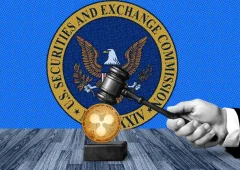Federal Reserve Holds Rates Steady as Economic Uncertainty Mounts
19.03.2025 20:03 1 min. read Alexander Zdravkov
The Federal Reserve opted to keep interest rates steady, as anticipated by most.
With this decision in place, all eyes will now be on Jerome Powell’s upcoming address at 21:30 Türkiye time, where investors and analysts hope to gain insight into the Fed’s outlook.
This decision comes at a time of heightened economic uncertainty. Shifts in trade policy under the Trump administration, widespread job cuts within the federal workforce, and broader financial pressures have raised concerns about slowing economic momentum.
Although the post-election period initially sparked optimism, key indicators now suggest consumer spending and job creation are losing steam. Efforts to downsize government operations, spearheaded by Elon Musk’s Department of Government Efficiency (DOGE), have intensified these challenges, particularly in regions dependent on federal employment.
READ MORE:

JUST IN: SEC to Drop Appeal Against Ripple
The financial markets have also reacted sharply. The S&P 500 recently slipped into correction territory, registering a 10% drop from its recent high—the steepest decline in three years. Investors remain wary of the long-term consequences of current policies, complicating the Fed’s path forward.
Former Treasury Secretary Larry Summers weighed in on the situation, describing it as a unique challenge for central bankers. He noted that rising import costs and declining employment are creating what he called a “stagflationary shock,” a sentiment echoed by several financial experts assessing the economic landscape.
-
1
Billionaire Slams Meme Stock Hype and Sounds Alarm on U.S. Fiscal Health
15.06.2025 18:00 2 min. read -
2
Robert Kiyosaki Predicts 2025 “Super-Crash,” Urges Hoarding Gold, Silver, and Bitcoin
23.06.2025 13:31 2 min. read -
3
Nassim Taleb Says Global Trust Is Shifting from the Dollar to Gold
22.06.2025 17:00 1 min. read -
4
Billionaire Investor Sees Dollar Crash If Key Support Breaks
18.06.2025 15:00 1 min. read -
5
Geopolitical Shockwaves Hit Ethereum Hard While Bitcoin Stays Resilient
22.06.2025 16:21 1 min. read
Robert Kiyosaki Predicts When The Price of Silver Will Explode
Robert Kiyosaki, author of Rich Dad Poor Dad, has issued a bold prediction on silver, calling it the “best asymmetric buy” currently available.
U.S. PCE Inflation Rises for First Time Since February, Fed Rate Cut Likely Delayed
Fresh data on Personal Consumption Expenditures (PCE) — the Federal Reserve’s preferred inflation gauge — shows inflation ticked higher in May, potentially delaying the long-awaited Fed rate cut into September or later.
Trump Targets Powell as Fed Holds Rates: Who Could Replace Him?
Federal Reserve Chair Jerome Powell is once again under fire, this time facing renewed criticism from Donald Trump over the Fed’s decision to hold interest rates steady in June.
U.S. National Debt Surge Could Trigger a Major Crisis, Says Ray Dalio
Billionaire investor Ray Dalio has sounded the alarm over America’s soaring national debt, warning of a looming economic crisis if no action is taken.
-
1
Billionaire Slams Meme Stock Hype and Sounds Alarm on U.S. Fiscal Health
15.06.2025 18:00 2 min. read -
2
Robert Kiyosaki Predicts 2025 “Super-Crash,” Urges Hoarding Gold, Silver, and Bitcoin
23.06.2025 13:31 2 min. read -
3
Nassim Taleb Says Global Trust Is Shifting from the Dollar to Gold
22.06.2025 17:00 1 min. read -
4
Billionaire Investor Sees Dollar Crash If Key Support Breaks
18.06.2025 15:00 1 min. read -
5
Geopolitical Shockwaves Hit Ethereum Hard While Bitcoin Stays Resilient
22.06.2025 16:21 1 min. read

